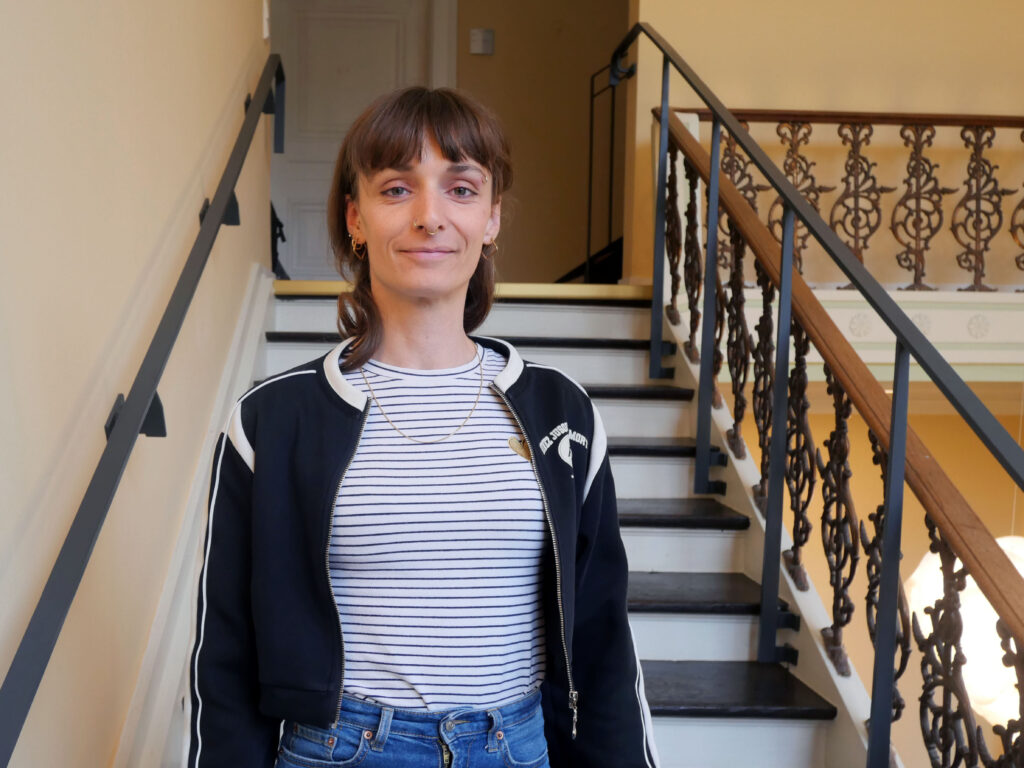c:o/re Junior Fellow 09/24 – 02/25

Sam Ducourant [she/her] works on the history and philosophy of sciences involved in animal production. At c:o/re, she engages in a critical assessment of the notion of lifelikeness when applied to livestock environments. She contends that the notion of lifelikeness is likely to be linked to the mechanization or conceptual reduction of living beings to production processes. Sam holds a PhD from the École Normale Supérieure (Paris, France), where she wrote an epistemological and technical history of animal welfare sciences and their role in the industrialisation of animal production. After her stay at the KHK c:o/re, she will join the HACAB (Human-Animal Collectives Assisting the Biosphere) project at University of Liège (Belgium). Sam has been a pre- and post-doctoral fellow at the Max Planck Research Group « Practices of Validation in the Biomedical Sciences », led by Lara Keuck (2022, 2024), at the Maison Française d’Oxford (2023), at Université de Montréal (2017-2018).
Lifelike Controlled Environments: A Biohistory of Applied Agricultural Research, Ignorance and Resistances
Lifelikeness nowadays develops as a theme in STS mainly about synthetic biology or AI and robotics. During my stay at KHK, I wish to widen these reflexions about lifelikeness in two directions. First, by studying sciences directly involved in the mechanization of life, with a view to making it more productive. Second, by questioning the role of scientific practices in the reduction of life to something knowable and/or controllable. Taking up Canguilhem’s understanding of biology not only as a knowledge, but mainly as a practice of life itself, and making it more explicitly politically relevant by connecting it with the study of biopower in the Foucauldian sense, I contend that lifelikeness can either be a tool to reduce, know and control life, or, on the contrary, to enhance life’s resistances, creativity and political generativity.
I will base this philosophical study of lifelikeness on a historical account of agricultural applied sciences. The industrialisation of animal production in the 20th Century Western World consisted mainly in setting up controlled environments: battery cages used for laying hens, for example, enhanced production by putting all environmental variables (air composition and temperature, nutrition, genetic make-up, etc) under control of systems designers. These controlled environments result of the pursuit of a productive ratio between lifelikeness and machinelikeness. In a first phase, the elaboration of such controlled environments indeed required the reduction of animal lives to a set of predictable and controllable variables, that is, insisted on making animals more machine-like (Ducourant 2023a; Ducourant 2024; Ducourant and Lapicque 2023). But such machinelikeness did not come without challenges : social resistance to encaging animals was overcome by a change of the meaning of lifelikeness and naturalness of domestication (Sayer 2013).
Publications (selection)
Ducourant, Sam. Bien-être en cage. Paris : Presses universitaires de france. (in preparation)
Ducourant, Sam. Validating animal welfare or enhancing animal exploitation? In Questioning biomedical validity, edited by Lara Keuck. (in preparation)
Ducourant, Sam. 2024. Animal welfare as a pretext towards agricultural market unification. European directives on animal welfare, 1979-1999. Revue semestrielle de droit animalier, 1(24).
Ducourant, Sam, and Lapique, R. 2023. Animal voices. Animal productions, total control through silenciation : initiating research in critical animal studies and subaltern studies in France. In Langages humains, langages animaux, edited by Cédric Sueur. Charenton-le-pon : Presses universitaires de Valenciennes.
Ducourant, Sam. 2023. Science or ignorance of animal welfare? a case study: scientific reports published in preparation for the first european directive on animal welfare (1979-1980). Science, Technology, & Human Values, 48(1): 139–166.

